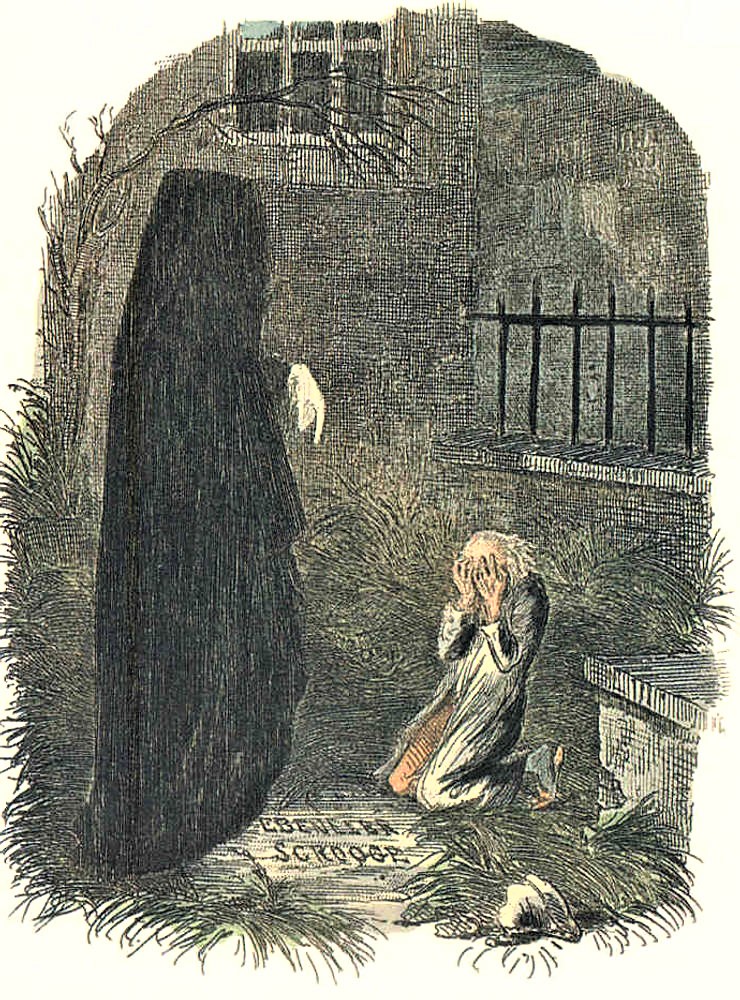
“But if the courses be departed from, the ends will change. Say it is thus with what you show me!” —Ebenezer Scrooge
A Christmas Carol in Prose Being a Ghost Story of Christmas first appeared in 1843, and for 180 years its message of redemption is more important than ever.
Ebenezer Scrooge, a “squeezing, wrenching, grasping, scraping, clutching, covetous old sinner,” is quick to criticize his nephew, his put-upon bookkeeper, and everyone about the utter wastefulness of a season that brings joy to everyone except himself. Choosing to be closed off, Scrooge grumbles his way through life doomed to remain stuck wearing the chains of victimhood, misery, and helplessness. The cause of his unhappiness is anger at the loss of love: the death of his mother in childbirth; the death of his sister; and a bitter break-up with his fiancé.
In the joy of others, he sees only his despair. This is a man who hates himself more than he hates others.
Today’s America shares much of Scrooge’s despair stuck in a present that appears more hopeless each day: domestic terror; homelessness; a deadly virus; willful ignorance; political division turned violent, much of it endlessly repeated in a bombardment of false information and Twitter rants that only make things worse. These are all symptoms of a disease of anger: prejudice, dishonesty, and distrust—everything that America does not stand for.
Where once we were united in fighting prejudice, we see a revival of hate. Where once we were united in standing up to bullies, many have surrendered to misery seeing themselves as victims, seeing their lives through the bully’s eyes of disillusionment and distrust, lies of the heart and mind.
Dickens’ Scrooge was the embodiment of lies. He lied to others when he criticized the value of Christmas. He lied to his nephew and Bob Cratchit about the importance of joy, respect, gratitude and brotherhood. And he lied to himself that he had nothing left to give but a callous cynicism.
In the last 4 years, the country has lied to itself: that division is more important than unity; that the lies some hold onto are justifications for hate and violence. And belief in those lies by some has only grown more intense.
While the richest man in town, the essential human ingredient Scrooge lacks is compassion for others and himself. He doesn’t see a place for it in his life and thus only believes he’s been made a victim by others for holding those beliefs. Visited by the ghosts of the Past, Present, and Future, he sees what was, what is and what could be if he remains unchanged.
Compassion is what turns Scrooge around: compassion for his impoverished clerk whom he ultimately helps; and re-engagement with his nephew, the son of his sister, in whom Scrooge sees a brighter, more inclusive future. The ghost of a dark and lonely death opens his eyes to the possibility of that future.
“‘Spirit!’ he cried, tight clutching at its robe . . . Why show me this, if I am past all hope!’
“‘Good Spirit, . . . Assure me that I yet may change these shadows you have shown me by an altered life!’
“The hand trembled.
“‘I will honour Christmas in my heart and try to keep it all the year. I will live in the Past, the Present, and the Future. The Spirits of all Three shall strive with me. I will not shut out the lessons that they teach.”
That moment is Scrooge’s deliverance.
The message of Dickens’ story is one for all of us no matter our sufferings, large or small. We can change our future. We can reunite. We can embrace a more compassionate life and bring about change in ourselves and, by our example, begin to see change in others.
That’s what I’m rooting for. That’s my Christmas prayer.
All of us need to honor Christmas in our hearts all the year. The spirits of our Past and Present are the lessons for our future. Let’s try to remember that as we strive to enable America’s deliverance.
I will return New Year’s Eve.
Comments









